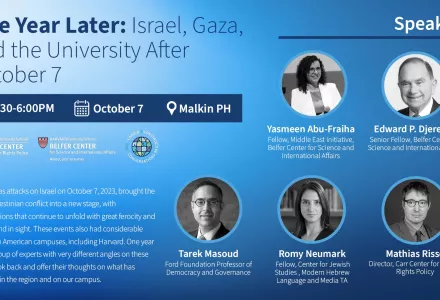Yasmeen Abu Fraiha is a fellow with the Middle East Initiative and a medical doctor with a specialty in internal medicine, currently completing a clinical fellowship in critical care medicine at Beth Israel Deaconess Medical Center in Boston. Her research focuses on healthcare policies and politics that create inequality in health services and outcomes for underserved communities. She formerly served as the Health Policy Director at the Task Force for Health Promotion and Equity in the Arab Society at the Israeli Ministry of Health, leading major efforts and interventions to deal with health disparities between Jews and Arabs in Israel. In 2016 she co-founded and managed Rodaina, an NGO that aims to prevent genetic diseases in the Middle East, especially in the Bedouin community, by spearheading premarital genetic testing and matching. In 2019 she co-founded Yanabia, an organization that promotes socio-economic development of the Bedouin community in Israel, while focusing on health, education, women's employment, housing and community empowerment. She also serves on multiple Board of Directors of NGOs aiming to improve Bedouin lives in Israel. She has won several awards, including the 2007 Ramon Award for quality, leadership, and excellence and was chosen to be part of Forbes' "30 Under 30" list. In 2023, she was named one of Israel's 50 most influential women by Globes Magazine. Yasmeen holds a BSc and MD from the Hebrew University of Jerusalem, and an MPA from Harvard Kennedy School.
Ambassador (Ret.) Edward P. Djerejian joins Harvard Kennedy School's Middle East Initiative as a residential Senior Fellow following his almost 30-year tenure as founding director of Rice University's Baker Institute for Public Policy (1994 to 2022). Djerejian joined the U.S. Foreign Service in 1962 after his service in the Army in Korea (1961-1962). His 32-year diplomatic career spanned eight presidential administrations from John F. Kennedy to William J. Clinton. Djerejian is a leading expert on national security, foreign policy, public diplomacy, and the complex political, security, economic, religious, and ethnic issues of the broader Middle East. He has played key roles in the Arab-Israeli peace process and regional conflict resolution. He is the author of Danger and Opportunity: An American Ambassador's Journey Through the Middle East. He was staff assistant to George W. Ball, the Under Secretary of State, from 1962 to1964. He served as a political officer in Beirut, Lebanon (1966-1969) and Casablanca, Morocco (1969-1972). Between 1975 and 1977, he was assigned as Consul General in Bordeaux, France. He was assigned to the U.S. Embassy in Moscow from 1979 to 1981, where he headed the political section, during the critical period in U.S.-Soviet relations marked by the invasion of Afghanistan. Djerejian served as Deputy Chief of the U.S. mission to the Kingdom of Jordan (1981-1984). Djerejian was assigned to the White House in 1985 as Special Assistant to President Ronald Reagan and Deputy Press Secretary of Foreign Affairs. He was Deputy Assistant Secretary of Near Eastern and South Asian Affairs (1986-1988). Djerejian served both President Reagan and President Bush as U.S. Ambassador to the Syrian Arab Republic (1988-1991). He then served under President Bush and President Clinton as Assistant Secretary of State for Near Eastern Affairs (1991-1993). He was appointed by President Clinton as United States Ambassador to Israel (1993-1994). In these capacities, he played a key role in the Arab-Israeli peace process, the U.S.-led coalition against Saddam Hussein’s invasion of Kuwait, successful efforts to end the civil war in Lebanon, the release of U.S. hostages in Lebanon, and the establishment of collective and bilateral security arrangements in the Persian Gulf. Ambassador Djerejian graduated with a Bachelor of Science from the School of Foreign Service at Georgetown University in 1960. He received an Honorary Doctorate in the Humanities from his alma mater in 1992 and a Doctor of Laws, honoris causa, from Middlebury College. He speaks Arabic, Russian, French, and Armenian.
Romy Neumark is a renowned figure in Israeli journalism, celebrated for her innovative and impactful approach over the past two decades. She has leveraged the power of news reporting to promote social change and advocate for gender equality and diversity. Neumark currently brings her extensive experience to her academic work at Harvard University, where she teaches media, documentary filmmaking, and journalism in the Hebrew language. She is known for introducing and implementing new pedagogies in her classes, combining hands-on journalistic experience, new technologies, and a learning community approach. Her research and teaching interests are particularly focused on journalism training programs and initiatives aimed at equipping journalists to better cover the complexities of the region and Israel. During the 2023-2024 academic year, Neumark served as a Gerard Weinstock Visiting Lecturer at the Department of Near Eastern Languages and Civilizations (NELC) and she is also a Fellow at Harvard's Center for Jewish Studies. Neumark was awarded the prestigious Nieman Fellowship for journalists at Harvard (2022-2023), after 5 years in the position of senior news anchor at KAN, Israel's public broadcasting corporation. In this role, she created and hosted the daily "Night News" television program, as well as a weekly radio interview show. Neumark also led a peer mentoring initiative that fostered excellence, professional growth, and inclusivity among journalists in the newsroom.

